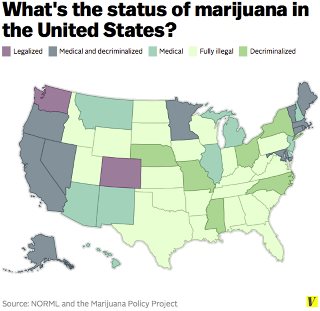Legalized Pot on the Ballot Again?

The map shows the current legality of pot by state. Photo courtesy of Vox.com
November 6, 2014
History was made in 2012 when Coloradans and Washingtonians both passed initiatives to legalize marijuana in their states. Even though at the state level in Colorado and Washington pot is now legal, federally it is still a class 1 controlled substance. The supremacy clause of the constitution dictates that federal law trumps state law, but the attorney general of the United States federal government–at the time it was Eric Holder–didn’t take any legal action against these states. The federal law in these states is not being upheld. This has created a precedent for other states to experiment with legalized drugs without any expected repercussions from the federal government. This November Florida, Oregon, Alaska, and the District of Columbia will have initiatives proposing more liberal marijuana laws. But no matter how many of these actually pass, the 2016 election promises even more initiatives debating the legality of marijuana.
The ballot measure in Florida actually will not completely legalize all forms of marijuana–just medical marijuana. Right now there are 21 states, including California, where medical marijuana is currently legal. Many Floridians, however, feel that this law is de facto legalization because in other states it has proven very easy to get a prescription for marijuana. But proponents of the initiative, and medical marijuana in general, espouse that the intentions are purely to help with pain relief.
Oregon is an interesting case because two years ago a measure to legalize marijuana was on the ballot there, but it failed. Many attribute this to the fact that the initiative in 2012 was poorly written and had no backing from national interest groups. This year, however, the same mistakes have not been made as Proposition 91 is thorough and is backed by several well organized groups like the Drug Policy Alliance. The prospects of Prop. 91 are seeming a lot better than they were in 2012.
Ballot Measure 2 in Alaska proposes essentially proposes full legalization of retail sales of marijuana but gives the state legislature power to tax and regulate–similar to the laws in Washington and Colorado and the proposed ballot measure in Oregon. Something strange about Alaska though is that it already has a quasi-legalization due to a 1975 Alaska Supreme Court ruling which stated that the right to privacy includes the right to grow small amounts of marijuana in one’s home. Because of this, Measure 2 has a good chance of passing. Recent polling in Alaska has favored legalization, but because Alaska is so big and the population is so spread out, polls from this state can never capture public opinion accurately.
Initiative 71 in Washington D.C. is intriguing because it makes it legal for citizens to possess small amounts of pot (up to 2oz.) and grow up to six plants in their home. But the United States Congress is technically in charge of the District of Columbia and Congress has outlawed marijuana for all purposes. Congress didn’t step in when D.C. voters legalized medical marijuana, but will they if Initiative 71 passes? It seems possible considering that residents of D.C. favor the initiative by an overwhelming majority. However, more and more people, like senior Melissa Hoo, feel that “[marijuana] will probably be legalized eventually.” So would Congress want to go against the tide of public opinion, especially during an election year that is crucial to the balance of power in the Senate? Likely not.
Already being prepared for the 2016 ballots are initiatives in five key states that can have the affect of propelling the idea of national legalization to the forefront of American politics. California is the most important state needed by supporters of legalization because the state is the most populated and without it a national bill would never be feasible. Californians voted on legalizing marijuana in 2010 with Proposition 19; it was narrowly defeated as 53.5% voted no and 46.5% voted yes. Supporters of Prop. 19 argued that the low voter turnout due to the fact it was a midterm election is what caused its failure and that a measure on the ballot in 2016 (a presidential election with presumably higher voter turnout) would be more successful. Also, interest groups have began collecting signatures in Maine, Massachusetts, Nevada, and Arizona.
The take away from this is that this year one or more states will be legalizing marijuana and that won’t be the end of the story. Initiatives to legalize marijuana will be on the ballot for years to come and whether or not it becomes legal federally is anyone’s guess.




































